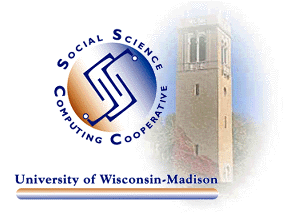
SSCC Summer Training Schedule
New Scanning Service for SSCC Members
Social Science Building Network
Secure FTP available for Connecting to Linux FTP Server
Tip: Dealing with Adware, Spyware, and Malware
SSCC's Summer training schedule is now available on SSCC's
training web pages. Results from our on-line survey conducted this spring
indicates people are interested in more advanced topics, so we've added a few
for this summer. We'd love more feedback if you have specific topics in mind.
E-mail Deb Brauer with your suggestions
and we'll consider them for next Fall. Remember that all SSCC training sessions
require preregistration. Register early before sessions fill!
SSCC staff are happy to announce a new scanning service for SSCC members. Student operators have been trained and are available for small scanning jobs using the scanner in the I/O room. They can scan photos, slides, negatives, and documents and write them to CD or network disk space. To make a request, bring your materials to the Operator in SSCC's computer room (4411) and fill out a Scanning Request Form. This form is also available from the Consultant in 4315. This service is for smaller jobs, so please limit your document requests to150 pages and no more than 20 photos, slides, or negatives per order. We may adjust these numbers after we see how much demand there is.
Work on recabling the Social Science Building has begun! By the end of October, when the recabling is complete and we've been connected to the new campus network backbone, we should have a faster network. (For details, read last month's announcement.) For those of you who missed the May 27 pre-construction meeting for all building occupants, here's a brief recap:
FTP is a very old protocol, dating from the days when the Internet was a much safer place. Thus it does not encrypt any of the information it sends, even user names and passwords. SecureFTP, or SFTP, encrypts all traffic between you and the server. Our Linux FTP server (ftp.ssc.wisc.edu) is now capable of using SFTP, though FTP is still allowed for now. SFTP is not yet available on our Windows FTP server (ntftp.ssc.wisc.edu), but watch for future announcements.
From Linux, using SFTP is as simple as typing sftp wherever you typed ftp before. From Windows you'll need a client capable of using SFTP. We recommend downloading SecureFX from DoIT, as it is free. Our publication Using SFTP has more details.
There has been a recent increase in the amount of adware (programs that make many popup windows in your web browser), spyware (programs that watch what you are typing or what web pages you visit), and other malware (undesirable software) on people's computers and laptops lately. This software can make your computer run more slowly, and can keep some programs from running at all. It may change the starting page of your web browser, or add "tools", usually for searching, onto your browser.
How does this unwanted software get onto your computer? In some cases, it was downloaded by a worm that SSCC staff removed from many computers in the Windows Primo domain several weeks ago. In other cases, someone unintentionally clicked on one of those pop-up windows that has a wonderful offer or asks a question. A final way that some people get this software is by responding to a pop-up window that says you have spyware on your computer and "click here to get rid of it." That click installs it.
How can you prevent this from happening to you? First, be sure that your operating system and antivirus software are up to date. That will prevent viruses and worms from installing other programs on your computer. Also, treat pop-up messages about the awful things on your computer with a healthy dose of skepticism. If it's from your antivirus software, the message is probably true; from your web browser it's probably not. There's not much you can do about those accidental clicks, but you may want to install a program to reduce the number of pop-up windows you get. If your PC is in the Social Science Building, contact the SSCC Consultant and we'll install software for you. If you want to install software on a home PC, you can download Ad-aware from DoIT's electronic shelf. Otherwise, contact Consultant for more advise.
What can you do if you do get unwanted software on your computer? SSCC staff can help you change your browser settings so that this software will have a harder time installing itself. We also have a number of tools to help remove this software from your computer, and to prevent it from installing. If you think you have any of this software on your computer, please contact the SSCC consultant.
Go to previous editions of
SSCC News.
Go to the SSCC Home Page.
© 2004 University of Wisconsin Social Science Computing Cooperative